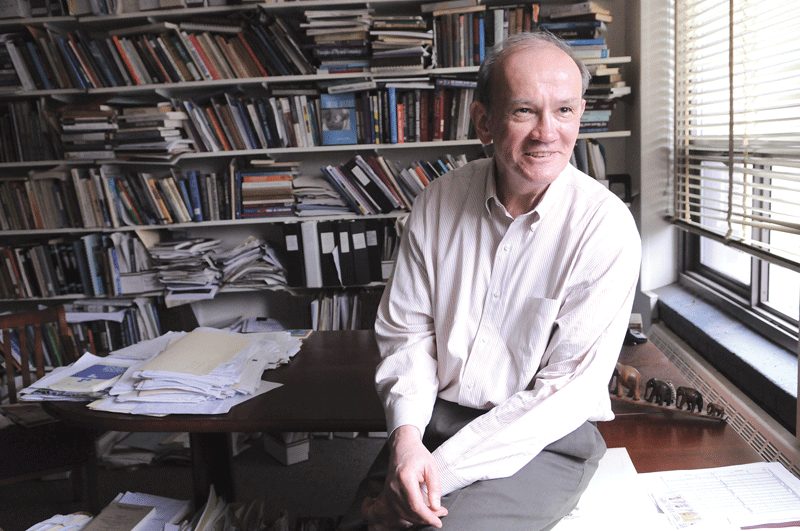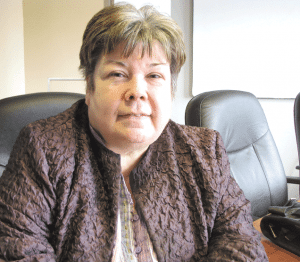
Running Out of Options
Older Unemployed Individuals Find Themselves in the Fight of Their Lives

Cheryl Adamson says she’s encountered a good deal of bias when it comes to her age, one of the reasons she’s been unable to find a full-time job for nearly two years.
But that is reality for this 55-year old Chicopee resident, and for countless others like her who find themselves trapped in a situation described as unprecedented by those who study labor markets and the trends now shaping them.
In a nutshell, jobs that were lost during the Great Recession and the years that followed are simply not being replaced at anything approaching the same pace. And while all age groups are affected by this development known as long-term unemployment, it is older workers, especially those 55 and over, who often find themselves on the outside looking in and, in some extreme cases, wondering if they will ever work again.
Older workers downsized or impacted by business closures face a number of challenges as they try to re-enter the job market, said Andrew Sum, director of Northeastern University’s Center for Labor Market Studies, who listed everything from a lack of needed skills, especially with information technology, to the simple fact that people have been out of work for months or even years, leaving a resume gap that intimidates employers, who see such individuals as damaged goods.
“The longer one is unemployed, the harder it is to get a job,” he said, “and the more likely it is that individuals will simply give up and leave the labor force.”
Adamson has seen all of this, up close, personal, and repeatedly. She first used the word ‘prejudicial’ to describe what was going on, but then settled on ‘biased.’
“Some people would blatantly ask me how old I was, either in interviews or over the phone,” she told BusinessWest “And I’ve heard a lot of people say I’m ‘overqualified,’ which I interpret to mean ‘you’re too old.’”
Tom Thebodo can certainly relate.

Steve Trueman says many older unemployed individuals are, or soon will be, in what he called “survival mode.”
[/caption]He took what he considered to be a reasonable gamble in January 2011, when Home Depot decided it would take over management of its warehouse operation in Westfield from the company it had hired to handle that assignment, Exel Logistics. Home Depot offered the workers an opportunity to keep their jobs, but at roughly two-thirds the salaries they were earning; Thebodo said ‘thanks, but no thanks.’
Nearly 26 months later, and close to a year after his unemployment benefits ran out, he is still looking for work and having serious doubts about whether he will soon get anything paying close to what he was making before.
“I haven’t had many bites at all — I’ve probably applied for 300 jobs and I think I’ve had two interviews,” he said, adding that one was for a seasonal, part-time position at Six Flags. “I want to work, and I think can outwork these younger guys that are getting the jobs, even though they aren’t very experienced, because they’re cheaper to hire. I’m just not getting any chances.”
Steve Trueman, director of Adult Workforce Programs for the Regional Employment Board of Hampden County, said many older workers like Adamson and Thebodo are, or soon will be, in what he called “survival mode,” which is certainly not how they intended to live in the years leading up to their retirement.
“People have lost their homes, they’ve lost their nest eggs, and they’re adjusting their lifestyles,” he said, adding that some are taking positions they are seriously overqualified for, and at a fraction of their former salary — if they can find anything at all — just to get by. “They’ve gone off the path of where they were headed; their plans have been derailed.”
And perhaps the most unsettling news for this constituency is that there is little, if anything, to indicate that conditions are going to improve any time soon. In fact, things could actually get worse before they get better.
Companies that downsized, or rightsized, during the Great Recession have found new ways to do the same, or more, with fewer people, said Trueman, adding that many employers are showing little desire to ramp back up to pre-downturn staffing levels. Meanwhile, looming sequestration could impact the situation in many ways — from eliminating many jobs, and thus creating even more competition for openings, to cutting off funding for programs to retrain people for new opportunities.
For this issue, BusinessWest turns the spotlight on long-term unemployment, especially as it impacts older workers. Not long ago, they were moving toward retirement with a plan; now those plans have changed, and they have to navigate what most would describe as uncharted waters to get back into the workforce.
Age-old Problem
Elizabeth Veillette’s business card declares that she is a “mature worker specialist” with CareerPoint, the one-stop career center based in Holyoke.
And she says that makes her quite unique in the field of employment services. “I’m not aware of anyone else who does what I do, not only in this state but nationally,” she said, adding that the grant-funded position involves work assisting and counseling older workers as they seek employment.
Many of these individuals are facing long-term unemployment (a technical term that means someone’s been looking for work for more than a year), she went on, adding that she works one-on-one with such clients, and also in workshops, such as one titled ‘Job Search Strategies for Mature Workers,’ and job-club activities.
Veillette was leading a job-club session just prior to talking with BusinessWest. This is a group of roughly 20 people, many of them facing similar challenges — and emotions — as they try to rejoin the workforce.
“A lot of them are only a few years from retirement, so they’re going through a lot of shock and a lot of grief,” she explained. “There’s a fair amount of working through the emotional piece to be able to pull yourself together enough to go and look for another job.”
She said many of those she works with have been with the same company for decades, have specialized skills that might make it difficult to get into another field, especially in the ultra-competitive environment that exists today, and little, if any job-search experience.
And these are just some of the challenges they face, she noted, adding that she’s noticed what she would have to call some bias against older workers.
And there are many more people hearing such words than at any time in the past three decades, or since the Bureau of Labor Statistics started keeping such stats, said Sum, co-author of a report issued two years ago titled The Dislocation Experiences and Labor Market Adjustment Problems of America’s Older Workers During the Great Recession of 2007-2009.
While preparing it, he discovered that the numbers of people in this state who had been unemployed for more than a year, and especially older workers, were much higher than he thought. A decade or so ago, the mean duration of unemployment among older workers in the state was 16 weeks, he said, noting that over the past 18 months, that number has risen to 50 weeks for those ages 55 to 64 and 44 for those over 65.
“We’ve never seen unemployment duration this high for older workers,” he told BusinessWest, “or for anyone else, for that matter.”
Those sentiments are backed up by Labor Department statistics showing that the number of people age 45 and older who have been jobless for more than a year has quadrupled since 2007, accounting for more than half of the 3.5 million Americans who have been unemployed long term.
Slicing through such numbers, Sum qualified the situation by saying that while there are more older individuals (over 55) working today, by percentage, than any other age group, it is more difficult for those in that demographic who are unemployed to rejoin the workforce.
“For older workers, when they’re unemployed for long periods of time, their recall rate gets to be pretty low,” he explained, adding that the longer one is out, the more this situation becomes exacerbated.
Idle Thoughts
People like Thebodo and Adamson don’t need statistics from the Labor Department, or Sum’s report, to tell them they’re facing something unusual — and extremely frustrating as they try to re-enter the workforce.
“I’m hanging in there, but it’s getting very depressing,” said Thebodo, adding that he is not yet ready to join the ranks of those who have simply given up in their search and thus technically, and ironically, are no longer classified as unemployed. “I’d just like someone to give me a chance to show what I can do, but no one will do that.”
These sentiments echo those of a woman (who asked to be identified only as ‘Debbie’) who has been out of work for the better part of three years now.
A former clerical worker for a municipality she also chose not to name, Debbie said she’s been hindered in her efforts to find a job by everything from what she considers to be average (at best) computer skills to the fact that she doesn’t speak Spanish.
“Everyone wants you to be bilingual today,” she said, using ‘everyone’ to describe those who have sat across the interview table from her.
Debbie said she’s had several temp jobs, none of which turned into anything permanent, and worked for a few weeks to get the Hobby Lobby store up and running at the Holyoke Mall, but was not among the 40 people ultimately hired by the company.
A member of a job club at FutureWorks, the one-stop career center based in Springfield, she said she tries to remain upbeat — “I always look at the glass at being half full” — and benefits from being around others who are facing the same challenges she is.
“I kind of feel like I’m lost and alone in this — you keep saying to yourself, ‘why can’t I find anything,’” she said. “When there’s other people in the same situation, it makes you feel better … you have to keep your chin up.”
Conrad Rogowski, manager of Career Services at FutureWorks, said such a positive attitude is critical for all those seeking to re-enter the workforce, but especially mature workers who have some inherent advantages over many younger applicants, he believes, listing everything from experience in a given field to a strong work ethic — and must exploit them.
“Age can certainly be a disadvantage, but it can also be an advantage — it depends on the individual,” said Rogowski, who works with a number of mature workers. “For the 55-plus workers, there are factors that can work for them or work against them. One of the big questions they face concerns whether they’ve kept up with technology, which is critical to their ability to be able to market themselves when they’re out of work.”
“Sometimes, people fall behind on technology, other times, the company they were working for falls behind,” he continued, adding that FutureWorks encourages such people to get caught up, not only with equipment and software, but also with the social media vehicles available to market themselves, such as LinkedIn and Twitter.
Meanwhile, he said, many older workers have to change their mindset somewhat and focus on what employers need, and not what they need as they pursue employment.
“At one time, a number of years ago, the focus was on ‘what’s in this for me?’” he noted. “But in this job market, what people have to focus on is the needs of the employer. And this is where some of the advantages of the mature worker come in.
“In a tough job market, employers are looking for a variety of things,” he went on. “They’re looking for longevity in jobs and depth in a work history; they’re looking for people skills, communication skills, maturity, productivity, and a work ethic, and these are all things that a mature worker can demonstrate on their resume, and can certainly demonstrate once they have an opportunity to get in front of an employer at an interview.”
The Bottom Line
Adamson told BusinessWest that she’s been trying to stress her experience, what she can do for an employer, and how she can be as asset — even if she is overqualified for the job in question — but just hasn’t been given any chances to prove herself.
When asked to describe what that’s been like, she summoned the word ‘humbling,’ while noting that her joblessness has come at a time of other losses in her life, including her fiancée, who died a few years ago, so she keeps things in perspective.
“You have to really stay positive about things,” she said, noting that the aforementioned part-time job she’s seeking isn’t anything approaching management. But it is something she needs on so many levels — from the financial to the standpoint of self-esteem.
Such is life when one is in survival mode — and that is the unfortunate reality for many older individuals who thought the home stretch to retirement would be much different.
George O’Brien can be reached at [email protected]






